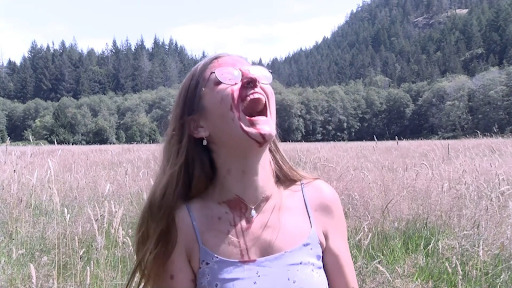One hot, dull summer day, starry eyed, red-headed dreamer Willow (Sophie Bawks-Smith) convinces her friends Jules (Jillian Frank), Leader (Destini Stewart), Vicky (Mari Geraghty), and Millie (Rowan Wales) to leave everything they know behind to all live together in an abandoned cabin in the woods. The girls create a set of rules that includes one called “suitable revenge:” if one does something bad to another, then the victim is allowed to exact “equal” revenge on the other (how the definition of the word “equal” is determined is left unspecified). This rule is meant to prevent anyone from ganging up on one another, but of course it has the opposite effect.
If you spent a lot of time doing a whole lot of nothing around a body of water with your friends as a young person (skater guys on one side, girls on the other), then HONEYCOMB will be twinged in nostalgia. It’s a film about the naivete of youth, and how that can be both beautiful and damaging; why exactly the girls decide to create their own micro society is unclear, but isn’t that the folly of youth? Doing something drastic, just to see what happens. Are they trying to “find themselves,” or escape the rules of a society that doesn’t understand them? Of course, honeycombs of girls can’t survive without rules, without structure (think of all the rules in MEAN GIRLS), and they end up trapping themselves in a prison of their own making.
Willow, floating in glittering water, delivers a monologue about the impermanence of a moment, how moments are ultimately destroyed by the forces of time and memory—it’s a beautiful monologue, but she’s taking herself way too seriously for someone who has no idea what she’s talking about, and that’s why I love her so much. Willow is the character who guides them to the cabin in the first place, and, without being a Regina George type, she’s the clear leader. Bawks-Smith carries the most convincing performance of all the girls; Willow is both confident and insecure, a nerd and a “cool girl,” and I wish there were more of her in the film. She knows who she is, but she still desperately seeks the others’’ approval when she doesn’t need to be; they respect her naturally.

Stylistically, the film follows in the footsteps of past dark-sided dreamy teen girl dramas (PICNIC AT HANGING ROCK, THE VIRGIN SUICIDES), and adds its own poison-sweet brand of Gen Z apathy told through a distinctly Gen Z lens. This is refreshing: we’re so used to watching “Gen Z culture” be forced down our throats by older generations who have spent more time studying marketing than actually interacting with any young people. There’s a lot of anger and sadness under those flowery dresses, the long flowy hair, and Doc Martens. The girls don’t want you to know that, but director Avalon Fast reveals their inner darkness with shadowy and uncanny cinematography; romantic, lo-fi DAYS OF HEAVEN tall grass can’t hide their secrets forever. When tragedy strikes the bunch, the majority are able to stare into the camera and shrug it off, wanting to show that nothing can affect the cool veneer they’ve each cultivated. Even in the face of death, they’re too cool to care.
People are too quick to say that LORD OF THE FLIES could never happen with girls because girls are too nice (or some fluffy bullshit like that), but those people have obviously never had their boyfriend snatched by a friend, or their favorite dress “borrowed” by a sister. I was hoping to watch the girls stew in the secluded pressure cooker that they created, but HONEYCOMB never reaches LORD OF THE FLIES-level character analysis because other, less important and far less interesting characters (the skater boys) keep entering and interrupting the girls’ path to self discovery (or destruction). Whereas in THE VIRGIN SUICIDES, the boys’ purpose is to observe the Lisbon sisters from a distance and “create the noise that seems to fascinate them,” the HONEYCOMB boys keep butting into the girls’ cabin (sometimes invited, sometimes not). They’re a distraction that eats up too much runtime that could have been spent further delving into the minds and friendships of girls feeling so estranged by society that they leave it altogether.
Obviously, boyfriends and ex-boyfriends often play a part in conflict among teenage girls, but I don’t think that should have taken away so much from the complex character psychology created by co-writers Avalon Fast and Emmett Roiko. Too much time is spent watching the boys play instruments, and not enough spent on the tension between the girls boiling over. I say this with a lot of love in my heart for my younger self and younger girls everywhere: house shows are not inherently interesting just because they are house shows. Avalon Fast is a rising young filmmaking talent inspired by her friends, and I’m excited to see what she does next.
















Comments